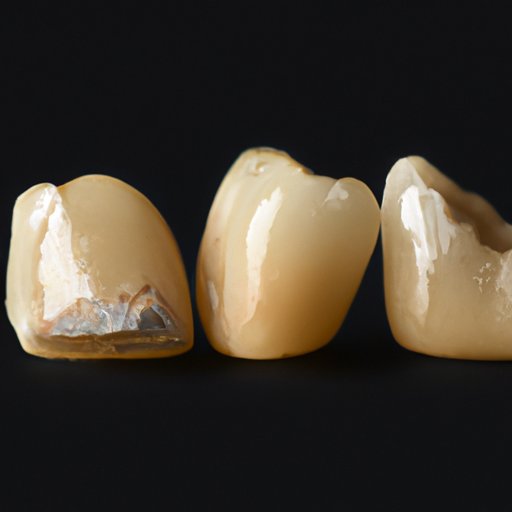Introduction
A chipped tooth refers to a tooth with a small fragment missing from its edge or surface. Though it may appear harmless, neglecting a chipped tooth can result in more significant dental issues in the future. In this article, we discuss the importance of repairing chipped teeth, the different methods of repairing them, and preventive measures to avoid future chipping.
Quick and Easy Fixes for Chipped Teeth: Tips from Dental Experts
If you have a chipped tooth, you want to fix it quickly. Dental bonding, veneers, and crowns are the most common options that dental experts advise.
Bonding is a simple and inexpensive method to repair chipped teeth. A dentist applies a tooth-colored resin to the affected tooth, shaping it to match the natural contour of the tooth. With the help of a special light, the resin bonds and hardens onto the teeth, giving your teeth a natural finish.
Veneers are a more permanent solution than dental bonding; however, they can be more expensive. These are wafer-thin shells that the dentist affixes to the front of the teeth. They are custom-made to fit your teeth and give you a beautiful, perfect smile. In most cases, this technique can be done in two appointments.
If your chipped tooth is severe, your dentist may recommend a crown. A crown is an artificial cover that fits over the chipped tooth, restoring its shape and appearance. This solution is the most costly but helps strengthen your teeth as well.
Each of these options has its pros and cons. Bonding is less expensive but requires regular maintenance. Veneers can last for up to 20 years but are expensive. Crowns can last longer but remove more of the natural tooth’s structure and are more expensive. Your dentist can provide detailed information to help you decide which is right for you.
DIY at Home Remedies for Fixing Minor Tooth Chips
If you have a minor chipped tooth, you can use some home remedies to reduce the chips’ appearance and prevent further damage. Here are some natural remedies that you can use at home for minor tooth chips:
1. Saltwater rinse: Rinse your mouth with salt water, which can help reduce bacteria in your mouth and promote healing of the affected area.
2. Herbs: Herbs like chamomile and peppermint contain anti-inflammatory properties that can help reduce swelling and inflammation you may feel after chipping your tooth. Place a small bag of these herbs against the chipped tooth for 15 minutes after a saltwater rinse to help alleviate symptoms.
3. Chewing Sugar-free Gum: Chewing sugar-free gum can stimulate the production of saliva in your mouth, promoting healing and protecting the chipped area from further damage.
4. Over-the-counter filling kit: For small, temporary repairs, you can buy an over-the-counter (OTC) filling kit that contains dental cement. This provides a quick fix for the chipped tooth until you can see your dentist.
Chipped Tooth Emergency: What to Do Until You Can See a Dentist
If you have a chipped tooth emergency and cannot wait to see a dentist, there are first aid measures you can take to alleviate symptoms and prevent further damage:
1. Rinse your mouth with warm salt water to clean the area and reduce the bacteria.
2. Use a cold compress to help reduce swelling and numb the area around the chipped tooth.
3. Take over-the-counter painkillers such as acetaminophen or ibuprofen.
4. Schedule an appointment with your dentist as soon as possible.
If you experience unbearable pain, rapid swelling, or bleeding, seek immediate medical attention in an emergency room.
The Tooth Chip Repair Guide: Comparing Procedures and Costs
When you visit your dentist for tooth repair, they will recommend the most appropriate repair method based on the severity of your chip. Here is a rundown of the most common chip repair options:
1. Bonding: Most inexpensive ($100-$1000 per tooth), least invasive, lasts longer than filling, but requires regular maintenance.
2. Veneers: More expensive (between $500-$2,500 per tooth), require two appointments, last up to 20 years, and require maintenance.
3. Crowns: The most expensive (between $800 – $3,000 per tooth), the most invasive, last the longest (between 10-15 years), and require maintenance.
Some dental insurance policies cover the costs of fixing a chipped tooth. It’s essential to discuss this with your insurance provider to understand what is covered and what isn’t.
Preventing Tooth Chips: Habits to Adopt and Foods to Avoid
The easiest way to prevent tooth chips is to maintain good oral hygiene. Brushing twice a day and flossing regularly removes bacteria and strengthens the teeth. Furthermore, avoiding hard or chewy foods such as popcorn, hard candy, and ice can also reduce the likelihood of chips. If you have a habit of grinding or clenching your teeth, your dentist might provide a night guard to protect your teeth while you sleep.
Conclusion
A chipped tooth may result from a variety of causes, from accidental injuries to eating hard foods. It is essential to fix a chipped tooth to prevent bacteria build-up and reduce the risk of infection and further damage to the tooth. From DIY natural remedies to professional dental procedures, several options are available for repair, depending on the severity of your chip. Adopting good oral hygiene practices and avoiding hard or chewy foods also keeps your teeth healthy. Last but not least, if you’re experiencing pain or other dental emergencies, do not hesitate to seek professional help.
